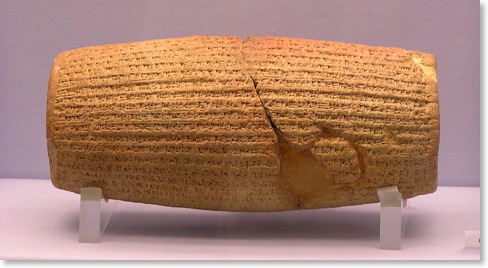Loose Loins Sink Kings (Isaiah 45:1)
I’ve read through the book of Isaiah quite a few times, but I’ve discovered over the years that when I prepare to teach a passage, I always find new elements of the text I hadn’t seen before. One of these insights came from a phrase I came across in Isaiah 45:1, which is part of Isaiah’s prophecy to Cyrus.
In the Hebrew, the phrase is simply וּמָתְנֵי מְלָכִים אֲפַתֵּחַ which translates somewhat literally as “and loins of kings I will loosen/open.”
The context revolves around Cyrus of Persia, the king who would allow the Israelites to return to their homeland and rebuild Jerusalem and the Temple as chronicled in 2 Chronicles 36 and Ezra. Cyrus is an interesting individual. He was a pagan king, comparable to Nebuchadnezzar who, in spite of his foreign religion, was called God’s servant (Jer 25:9; 27:6; 43:10). Like Nebuchadnezzar, God chose to work through this non-Israelite as part of his divine purposes, demonstrating his sovereignty even upon those who do not acknowledge him.
There are allusions to David in God’s depiction of Cyrus. He calls him “my shepherd” (רֹעִי) in Isa 44:28 and perhaps more startlingly his “anointed one” (מָשִׁיחַ, /māšiyaḥ). Thus Cyrus is the only individual in the Bible to be called “anointed one” (or messiah) outside of Israelite kings, priests and Jesus Christ. Cyrus had also been raised by a shepherd. Further, there seems to be imagery related to Moses as well as Cyrus becomes the one who leads (by decree) God’s people out of their captivity to the Promised Land.

Above: The Cyrus Cylinder which includes detail of the king’s granting expatiates permission to return to their homelands.
Source: Bible Lands Photo Guide, version 3 (Accordance)
I try very hard when I’m preparing a lesson to attempt interpretation by myself first before consulting commentaries. I had to admit (although it seems somewhat obvious now) that I was stumped by this reference to God loosening the loins of Cyrus’ rival kings. I’ve begun teaching from the New Living Translation on Sundays, and I consulted Isa 45:1 in the NLT:
This is what the LORD says to Cyrus, his anointed one,
whose right hand he will empower.
Before him, mighty kings will be paralyzed with fear.
Their fortress gates will be opened,
never to shut again.
Most formal translations simply translate the phrase literally, “loose the loins of kings” or something similar. The NLT certainly gets the end result across. I understood that. None of the kings who went before Cyrus would be able to stand before him. But what did the phrase actually mean? I wondered if it meant that foreign kings would be impotent before Cyrus, or perhaps it meant they would wet themselves. The problem, as I would later discover, was that my focus was too literally loin-centered.
Incidentally, when I taught the lesson Sunday and was relaying Cyrus’ rather colorful history, one person in the class asked whether Cyrus came “before or after ‘that guy’ in 300.” I told him that Cyrus came before Xerxes who was featured (rather outlandishly) in the movie 300. But I pointed out that the incredibly large army depicted in that movie had not been built by Xerxes (for the most part), but rather by Cyrus much earlier before him.
Using Accordance, I tried running searches for the exact phrase and then similar phrases, but to my knowledge (feel free to correct me if I’m wrong), there are no other occurrences of loins being loosened, only tightened up, or more appropriately girded up. And then suddenly it made sense! My problem was that I had not been thinking in terms of Hebrew and ANE culture.
At this point, thinking I’d figured it out, I went ahead and consulted a number of commentaries that confirmed my hunch. In the Bible, to “gird up one’s loins” (see Exod 12:11; 1 Kgs 18:46; 20:32; 2 Kgs 1:8; 4:29; 9:1; Job 12:18; 38:3; 40:7; Jer 1:17, esp. in more formal translations) was to tuck the ends of one’s garments into one’s belt so as to be ready for any kind of action, whether fight or flight. What was being described in Isa 45:1 was just the opposite.
Thus, before Cyrus, God would immobilize any king or king’s army who would oppose him. Their readiness for battle would come to nothing. The TNIV renders the phrase “strip kings of their armor” which nicely captures the military aspects just as the NLT’s rendering above relates the psychological end result. The ESV translates the phrase as “to loose the belts of kings,” but that sounds a bit too much like the aftereffects of a Thanksgiving meal.
Regardless, it’s clear in the passage that the God of the Bible is sovereign, choosing to use whom he will when he will, often despite the objections of those who feel themselves to be part of the “in group” (Isa 45:9-13). To those who first objected, God had this message:
“I will raise up Cyrus to fulfill my righteous purpose,
and I will guide his actions.
He will restore my city and free my captive people—
without seeking a reward!
I, the LORD of Heaven’s Armies, have spoken!”” (Isa 45:13, NLT)
And as history records, that’s exactly what happened.









